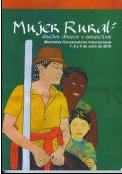Mujer Rural: derechos, desafíos y perspectivas/Rural Women: Rights, Challenges and Perspectives
El acceso a la tierra es uno de los problemas más graves que enfrentan las mujeres rurales en el mundo. Actualmente se calcula que existen 1.6 billones de mujeres campesinas (más de la cuarta parte de la población mundial), pero sólo el 2% de la tierra es propiedad de ellas y reciben únicamente el 1% de todo el crédito para agricultura3.












